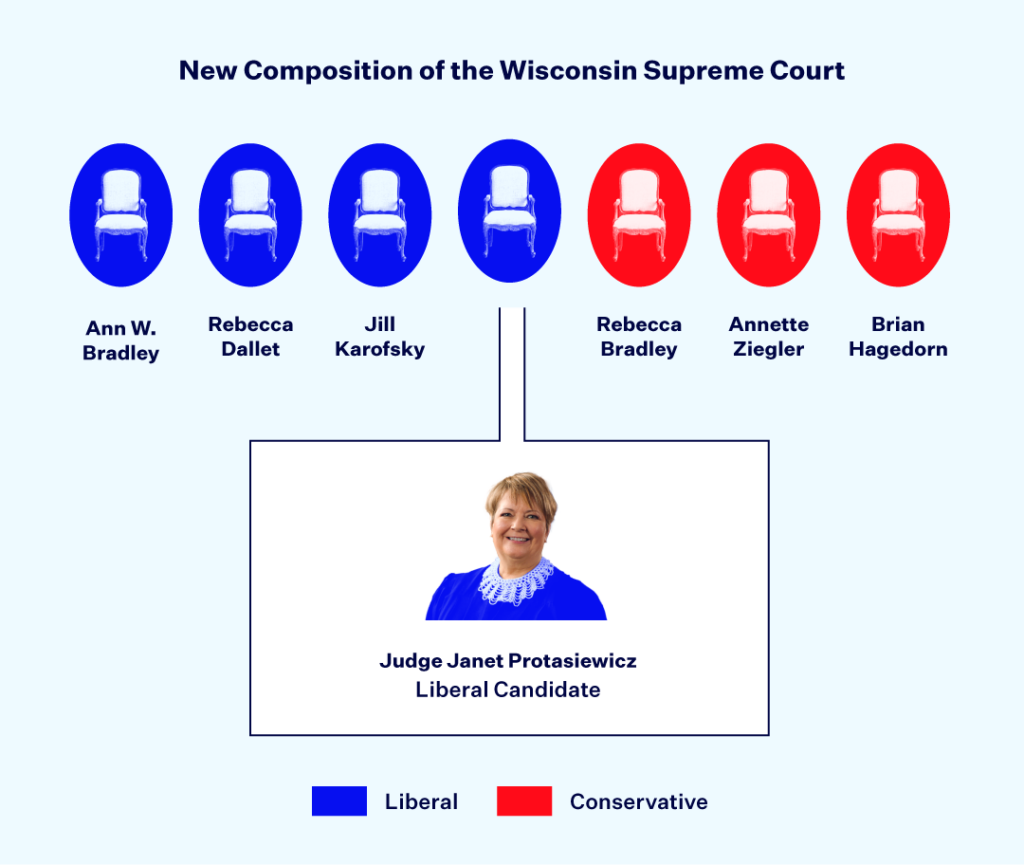A New Day Comes With a New Liberal Majority on the Wisconsin Supreme Court

Today is the first day of Justice Janet Protasiewicz’s decade-long term. It is the first time since 2008 that liberal justices have held the majority on the Wisconsin Supreme Court.
Only 24 states elect justices to their respective state Supreme Courts. Of those, 14 states hold nonpartisan elections, meaning that the judicial candidates run without a party affiliation, including Wisconsin. This means that the candidates for the Wisconsin Supreme Court this past spring, Judge Dan Kelly and Judge Janet Protasiewicz, signaled to voters what could be expected of their 10-year terms through campaign endorsements, board membership and their stances on political issues. Kelly’s endorsements included the NRA and former President Donald Trump whereas Protasiewicz was endorsed by the likes of Sen. Tammy Baldwin (D-Wis.) and Planned Parenthood.
An incredible amount of effort was focused on who would claim the vacancy on the state’s highest court. Over $45 million was poured into the race, making it the most expensive state Supreme Court race ever.
In a state known for its razor-thin margins, Protasiewicz soundly defeated Kelly within an hour of polls closing and with an 11-point margin. For context, Gov. Tony Evers’ (D) re-election by a 3-point margin in November was lauded as a landslide. Protasiewicz’s remarkable victory was a resounding referendum on the conservative policies values touted by Kelly and the bright future that Protasiewicz represented in contrast.
The Wisconsin Supreme Court decided monumental and nationally consequential lawsuits in 2020 and it’s fair to guess that there will be major election litigation in the state again in 2024. For the first time in 15 years, a liberal majority holds the court which could mean true progress for democracy in and out of the state.

Why did $45 million get poured into a nonpartisan state Supreme Court race and what can we expect next?
As the country turns to another presidential election in 2024, Protasiewicz’s presence on the court is critical.
Given its role as a consequential battleground state, Wisconsin became a target for litigation starting in 2020, a trend that continued through the 2022 midterms as the GOP sought to undermine mail-in voting. In 2022, Wisconsin saw the third-highest volume of litigation in the country, with three times as many lawsuits seeking to restrict voting access compared to those seeking to expand or protect voting rights.
Ongoing litigation in Wisconsin state-level courts over various aspects of mail-in voting, from how absentee ballot witness certificates are completed to the use of mobile absentee voting sites — and, most recently, the witness requirement itself and drop boxes — could eventually reach the state Supreme Court and impact future elections in 2024 and beyond.
The Ban on Drop Boxes
In July of 2022, with the conservative majority still intact, the Wisconsin Supreme Court issued a decision that banned drop boxes in a major blow to voters.
A lawsuit was filed in a trial court in Dane County last month that challenges, in part, the ban. This spring, when Democracy Docket asked Protasiewicz what she made of the decision, she noted that she generally aligns herself with the dissenting opinion in the drop box case: “I believe the dissenting justices were correct to reason that a ballot drop box is an extension of the municipal clerk because it ‘is set up by the municipal clerk, maintained by the municipal clerk, and emptied by the municipal clerk.’ The dissenting opinion also correctly asserts that outlawing ballot drop boxes will severely disadvantage the voting rights of marginalized communities.”
Trump’s Effort to Throw Out Over 20,000 Votes
In the 2020 post-election period, the Trump campaign filed a lawsuit seeking to invalidate thousands of votes cast in the Madison and Milwaukee areas, both Democratic strongholds. Protasiewicz highlighted this case in a comment to Democracy Docket; though the Wisconsin Supreme Court ultimately rejected that effort, Protasiewicz is “deeply concerned that only a bare majority stood in favor of a very, very simple reading of the law,” she told us. “Three out of seven justices would have overturned the results of the Presidential Election in Wisconsin and hand the state’s electoral votes to Donald Trump.”
Protasiewicz continued: “In 2016, Donald Trump won Wisconsin. Using the exact same electoral system, in 2020, Joe Biden won Wisconsin. The extreme, partisan right-wing justices who tried to overturn democracy in Wisconsin because they didn’t like the result should be ashamed of themselves.”
Partisan Gerrymandering
Wisconsin is known for having some of the most gerrymandered state legislative maps in the country. In the 2010 redistricting cycle, Republicans drew partisan gerrymanders that created outsized majorities in the state Senate and Assembly.
To Democracy Docket, Protasiewicz referenced a partisan gerrymandering case, Rucho v. Common Cause, as an illustrative example for her belief that right-wing extremists are hijacking the courts: “The judges decided the case on their own discretion and by their own views,” she told us, “rather than on judicial principles and precedent, which allowed right-wing justices to encourage polarization and unequal political representation.”
“Our democracy is one of our closely held ideals and that needs to be valued.”
In 2020, the presidential election was nearly overturned in Wisconsin. Democracy hinged on one conservative justice, Brian Hagedorn, standing with the three liberal justices in the face of the unconstitutional whims of the three right-wing justices.
Protasiewicz, who received $2.5 million from the Democratic Party of Wisconsin along with organizing support, promised to recuse herself from any cases brought by the party. The lawsuit filed last month that challenges the alleged burdensome absentee voting rules does not involve the party so if the case eventually reaches the state’s highest court, we can expect Protasiewicz to weigh in.
As Democratic Party of Wisconsin Chair Ben Wikler noted in his interview on our Defending Democracy podcast, Wisconsin “had been at the forefront of the progressive movement…for 150 years. Wisconsin was the state that first declared the Fugitive Slave Act unconstitutional, and helped spark the Civil War — in a good way. It was the first state to ratify the 19th Amendment, the first state to have protections in the law for LGBTQ people.”
With the start of Protasiewicz’s term, the Wisconsin Supreme Court is embarking upon a new era, and possibly a return to its progressive roots.